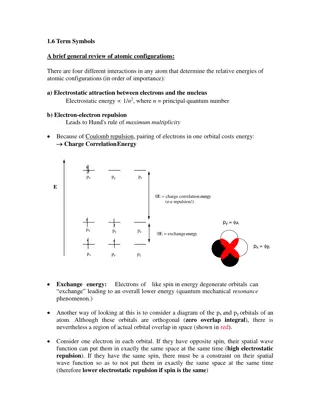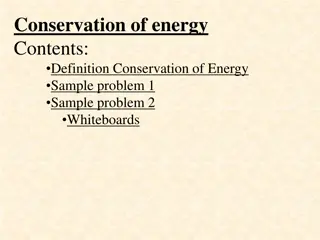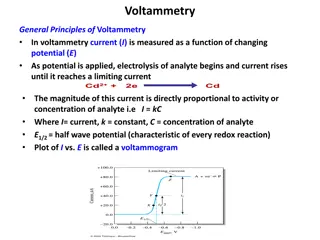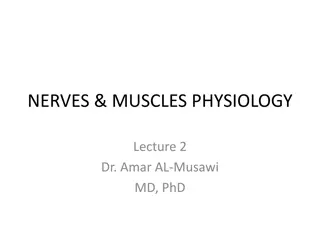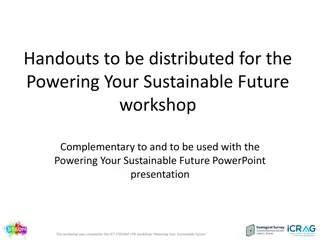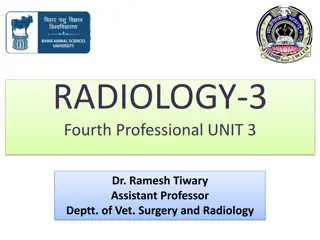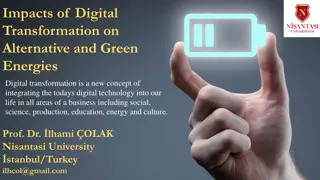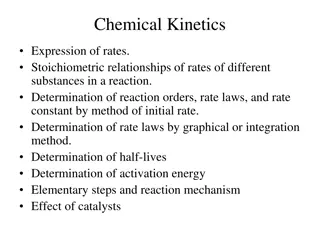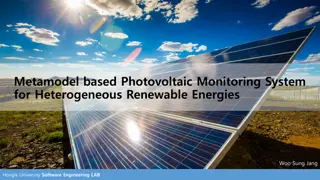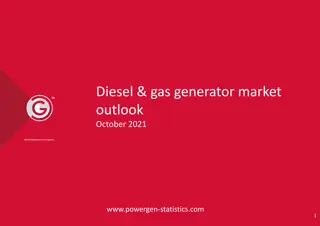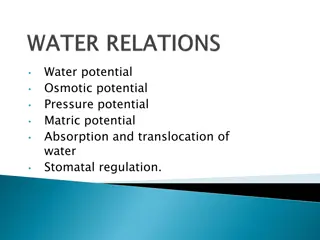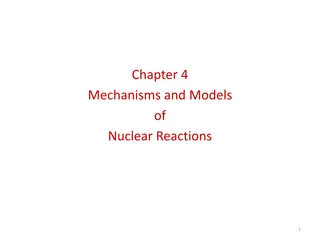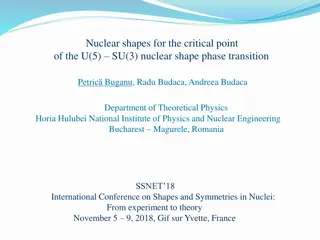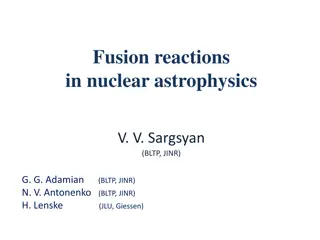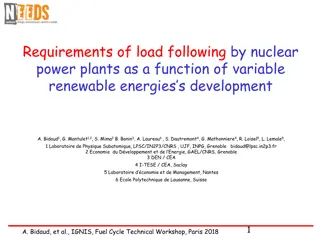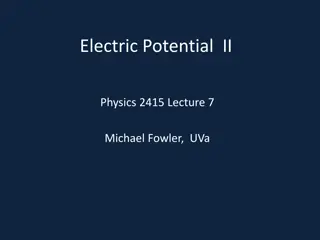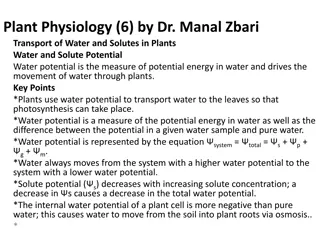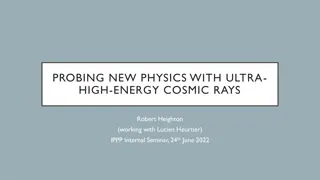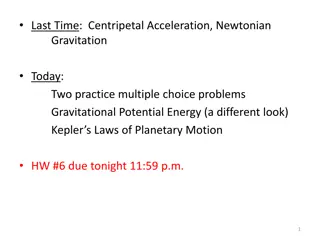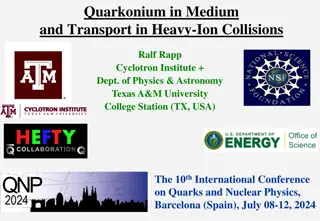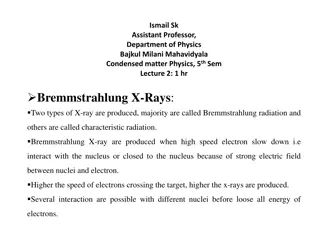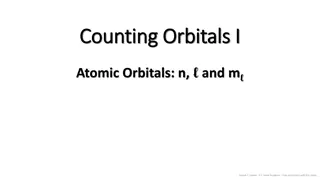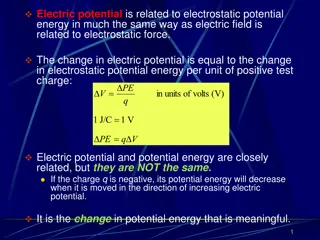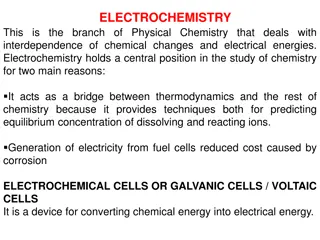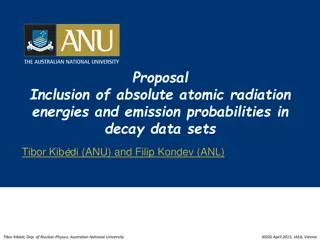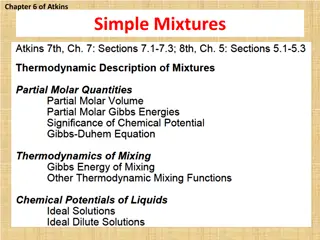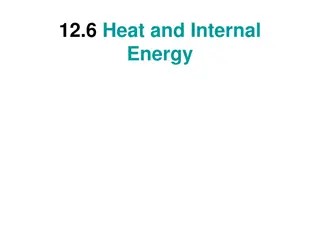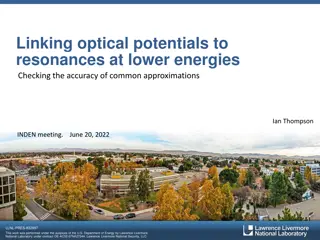Exploring Feng Shui and Place Energy Trends for 2022-2023
Diving into the realm of Feng Shui and place energy for the upcoming years of 2022-2023. Discover insights, practices, and guidance on utilizing Feng Shui principles to enhance your surroundings and create harmonious energies. Explore various aspects such as Bagua, Chi, and debunking skepticism arou
2 views • 26 slides
Short Learning Programmes: A Flexible Pathway to Tertiary Education
Short learning programmes offer a flexible pathway to tertiary education by providing micro-credentials that respond to labor market needs, focusing on ICT, renewables energies, automotive, and sustainable mobility. These programmes are designed to enhance skills, improve workforce readiness, and br
4 views • 13 slides
Possible Analog States of the Hoyle State in Heavier Nuclei
Research conducted at the National Research Centre, Kurchatov Institute, explores possible analogs of the Hoyle state in heavier 4N nuclei, focusing on the 7.65 MeV 0+2 state in 12C (Hoyle state). The study reveals insights into the structure and characteristics of the Hoyle state, crucial for under
0 views • 12 slides
Understanding Atomic Configurations and Term Symbols
The energy of atomic configurations is determined by electrostatic attraction between electrons and the nucleus, electron-electron repulsion, spin-orbit coupling, and spin-spin interactions. Term symbols in electronic spectroscopy specify atomic states using quantum numbers. Hund's rule and the Paul
8 views • 12 slides
Conservation of energy
Conservation of energy is a fundamental principle in physics that states the total energy in a closed system remains constant over time. This concept is applied through various sample problems and examples involving calculations of kinetic and potential energies. Whiteboard illustrations further exp
1 views • 21 slides
Physics Problem-Solving: Kinematics, Dynamics, and Laser Energy
Explore various physics problems involving linear kinematics, 2-dimensional motion, dynamics, laser energy, and more. Learn how to calculate velocities, distances, forces, energies, and photon properties in different scenarios.
5 views • 22 slides
Understanding Voltammetry: Principles and Applications
In voltammetry, current is measured as a function of changing potential. The magnitude of current is directly proportional to the activity or concentration of the analyte. A voltammogram is plotted between current and potential, showing the characteristic half-wave potential. The process involves a
6 views • 76 slides
Free Horoscope 2024
Horoscope 2024 provides a cosmic guidebook to help us traverse the energies of the year, with planetary movements influencing our experiences and personal development. Important astrological occurrences, such as Jupiter in Aries and Saturn entering Pisces, portend a year filled with audacious plans
0 views • 2 slides
Understanding Nerves and Muscles Physiology: Lecture Insights by Dr. Amar AL-Musawi MD, PhD
Delve into the intricacies of cardiac action potential, mechanism of action potential propagation, rhythmicity in excitable tissues, and the crucial concept of refractory period. Explore how voltage-gated channels influence the duration of action potential and learn about the spontaneous generation
0 views • 12 slides
Exploring Renewable Energy Sources in Portlaoise Workshop Overview
This workshop, designed for the JCT STE(A)M CPD workshop "Powering Your Sustainable Future," delves into renewable energy sources - wind, solar, and geothermal energies - in the Portlaoise area. Participants will analyze the social, economic, and environmental aspects of each energy source based on
0 views • 6 slides
Exploring Energy Stores and Transfers in Science Lessons
Dive into the fascinating world of energy stores and transfers through engaging science lessons. Recall different energy stores, common energy transfers, and create flow diagrams to illustrate energy transfers in various scenarios. Explore gravitational, elastic, magnetic, electrostatic potential en
5 views • 9 slides
ETEN Progress Update: Advancing Bible Accessibility Around the World
ETEN's mission is to advocate for Every Verse Current in all languages, ensuring access to the Bible for every community by 2033. The All Access Goals focus on making Bibles available to populations worldwide, tracking progress through the AAG Dashboard. Critical Analysis reveals ongoing translation
3 views • 28 slides
Understanding X-Ray Production and Interactions in Radiology
Explore the fundamentals of X-ray production, including the types of ionizing radiation and interactions of photons with matter. Learn about the photoelectric effect, Compton effect, and characteristics of X-ray tubes, essential for radiology professionals and students. Delve into the mechanisms beh
0 views • 17 slides
Gravitational Potential Energy Equations and Examples
Learn how to rearrange the potential energy equation, calculate potential energy using the formula PE = mgh, and solve for mass and height in relation to gravitational potential energy. Explore examples of calculating potential energy for objects at different heights. Understand the concept of gravi
0 views • 11 slides
Impacts of Digital Transformation on Alternative and Green Energies
The integration of digital technologies into alternative and green energy systems is transforming the way businesses operate and deliver value. Digitalization enables advancements in data, analytics, and connectivity, leading to improved renewable energy solutions such as solar power, wind power, bi
2 views • 7 slides
Understanding Chemical Kinetics: Rates, Reactions, and Mechanisms
Chemical kinetics involves studying reaction rates, rate laws, stoichiometry, and factors affecting reaction speed. This branch of chemistry delves into determining reaction orders, rate constants, and activation energies using various methods. Different types of rates, such as initial, instantaneou
2 views • 68 slides
Metamodel-based Photovoltaic Monitoring System for Renewable Energies at Hongik University
This project at Hongik University focuses on developing a metamodel-based photovoltaic monitoring system to address the challenges of managing diverse solar monitoring systems in Korea. By utilizing a unified data communication protocol, the system aims to streamline the monitoring process for solar
0 views • 18 slides
Diesel and Gas Generator Market Trends and Transition to Alternative Energies
In October 2021, the diesel and gas generator market outlook reflects growth with key insights on market performance in H1 2021. The market research company specializes in generating sets industry analysis, covering global databases and customized researches. The transition towards decarbonization t
0 views • 9 slides
Understanding Water Potential and Osmosis in Plants
This content delves into the concept of water potential, osmosis, and pressure potential in plant biology. It explains how water moves within plant cells, the unit of measurement for water potential, the role of osmotic potential in water movement, and the effects of solute concentration on water po
3 views • 18 slides
Mechanisms and Models of Nuclear Reactions
The chapter discusses the reaction cross-section in nuclear reactions, including resonance and tunneling phenomena. It explains the probability of reactions occurring, the influence of nuclear radius on cross-section, and how tunneling allows reactions at energies lower than the Coulomb barrier. Exa
0 views • 22 slides
Insights into Parton Branching Equation at LHC Energies
Multiplicity distributions play a crucial role in understanding the cascade of quarks and gluons at the LHC energies, revealing underlying correlations in particle production. Popular models like Monte Carlo and statistical models are used to describe the charged particle multiplicity distributions.
1 views • 17 slides
Understanding Electronic Excitation in Semiconductor Nanoparticles from a Real-Space Quasiparticle Perspective
This research delves into the electronic excitation in semiconductor nanoparticles, focusing on real-space quasiparticle perspectives. It explores treating electron correlation using explicit operators, leading to faster algorithms while calculating optical gap and exciton binding energies. Various
0 views • 45 slides
Nuclear Shapes at Critical Point of U(5)-SU(3) Phase Transition
Exploring nuclear shapes at the critical point of the U(5)-SU(3) nuclear shape phase transition using Bohr Hamiltonian with a sextic oscillator potential. The study investigates the transition from a spherical vibrator (U(5)) to a prolate rotor (SU(3)), providing insights into the Interacting Boson
0 views • 10 slides
Key Fusion Reactions in Nuclear Astrophysics
Fusion reactions play a crucial role in nuclear astrophysics, with key reactions involving light elements such as Li, Be, B, and stable carbon isotopes. Understanding fusion of light heavy nuclei at extreme energies is essential for predicting stellar evolution. The S-factor provides a convenient re
0 views • 31 slides
Load Following by Nuclear Power Plants in Relation to Variable Renewable Energies' Development
The study explores the requirements of load following by nuclear power plants in the context of variable renewable energies' growth. It discusses the impact of renewable energy development on nuclear economic models and the need for dispatchable capacities. Benchmarks are set to test robustness of d
0 views • 11 slides
Exploring Electric Potential and Equipotentials in Physics
Delve into the concepts of electric potential, equipotentials, and potential energies in physics. Learn about field lines, partial derivatives, potential energy changes for various charge configurations, and the significance of equipotentials. Understand how to calculate total potential energy for m
0 views • 27 slides
Understanding Water Potential in Plant Physiology
Water potential is a crucial concept in plant physiology, driving the movement of water within plants. It is a measure of potential energy in water and influences processes like photosynthesis. This potential is influenced by factors such as solute concentration, pressure, gravity, and matrix effect
0 views • 25 slides
Unraveling the Mysteries of Ultra-High-Energy Cosmic Rays and Neutrinos
Delve into the exploration of ultra-high-energy cosmic rays and cosmogenic neutrinos in the quest to uncover new physics phenomena. Examining the GZK limit, cosmic accelerators, detection methods, and the potential for detecting tau neutrinos in Earth, this seminar presents a comprehensive overview
0 views • 28 slides
Understanding Gravitational Potential Energy and Negative Potential Energy
Exploring the concept of gravitational potential energy beyond the surface of Earth, understanding how potential energy varies with distance from the Earth's center, and delving into the significance of negative potential energy at certain points. Learn about the calculations involved, including the
0 views • 17 slides
Cross-Border Management of Variable Renewable Energies and Storage Units
This EU-funded project, CROSSBOW, addresses industrial challenges and standards needs for managing variable renewable energies and storage units. It focuses on system integration with smart transmission grids and storage technologies to increase renewables' share. The project tackles four major inno
0 views • 11 slides
Quarkonium in Medium and Transport in Heavy-Ion Collisions
Discussing the properties and behavior of quarkonium in medium and its transport in heavy-ion collisions. Topics include heavy-quark potential, confinement, quarkonia at finite temperature, quarkonium transport, and quarkonia in heavy-ion collisions. Insightful details about in-medium potential and
0 views • 30 slides
Understanding Bremmstrahlung and Characteristic X-Rays in Condensed Matter Physics
In condensed matter physics, Bremmstrahlung X-rays and characteristic X-rays are produced through different interactions of high-speed electrons with nuclei in target atoms. Bremmstrahlung radiation is generated when electrons slow down near the nucleus, while characteristic radiation is produced wh
0 views • 5 slides
Understanding Atomic Orbitals: Counting, Subshells, Energies, and Electrons
Learn about the basics of atomic orbitals, including the counting of orbitals in shells and subshells, the distribution of electrons in different energy levels, and the symmetrical nature of orbital labeling. Dive into the rules governing electron placement based on quantum mechanics and explore the
0 views • 6 slides
Understanding Electric Potential and Its Relationship to Electrostatic Energy
Electric potential is intricately linked to electrostatic potential energy, much like how electric field correlates to electrostatic force. The change in electric potential equals the change in electrostatic potential energy per unit positive test charge, expressed in volts. By exploring scenarios s
0 views • 24 slides
Understanding Electrochemistry: The Interplay of Chemical Changes and Electrical Energies
Electrochemistry, a branch of Physical Chemistry, explores the relationship between chemical reactions and electrical energies. It serves as a vital link between thermodynamics and other areas of chemistry, offering insights into equilibrium concentrations and facilitating the generation of electric
0 views • 24 slides
Integration of Atomic Radiation Energies and Emission Probabilities in Decay Data Sets
Proposal by Tibor Kibdi and Filip Kondev to include absolute atomic radiation energies and emission probabilities in decay data sets. They emphasize the need for energy and intensity data to be computer-readable and use standard notation. The inclusion of atomic relaxation data into ENSDF is discuss
0 views • 7 slides
Electrostatic Distortion Studies at SINP Kolkata and DESY
Studies on electrostatic distortion were conducted at SINP Kolkata and DESY, focusing on a Large Prototype TPC experiment with Bulk Micromegas modules. The experiments included varying electron beam energies, gas mixtures, cosmic ray data collection, drift velocity estimation, and more. Distortions
0 views • 7 slides
Understanding Thermodynamics of Mixing in Atkins: Chapter 6 Overview
Unveil the intricacies of Chapter 6 from Atkins' book on Simple Mixtures. Delve into topics like Partial Molar Volume, Gibbs Energies, Chemical Potential, Gibbs-Duhem Equation, Thermodynamics of Mixing, and more. Explore key concepts such as Gibbs Energy of Mixing, Raoult's Law, Molecular Interpreta
0 views • 22 slides
Understanding Heat, Internal Energy, and Specific Heat Capacity
Heat is energy transfer due to temperature differences, measured in joules or calories. Internal energy includes kinetic and potential energies. Specific heat capacity is the heat needed to change temperature. Units like joules, calories, and BTUs are common. Calorimetry is used to measure heat chan
0 views • 13 slides
Exploring Optical Potentials and Resonances at Lower Energies
Investigating the accuracy of common approximations in linking optical potentials to resonances at lower energies. The study focuses on neutron reactions with 14N as a test case, transitioning from R-matrix theory to Hauser-Feshbach models and evaluating known levels and level densities. Key topics
0 views • 22 slides



